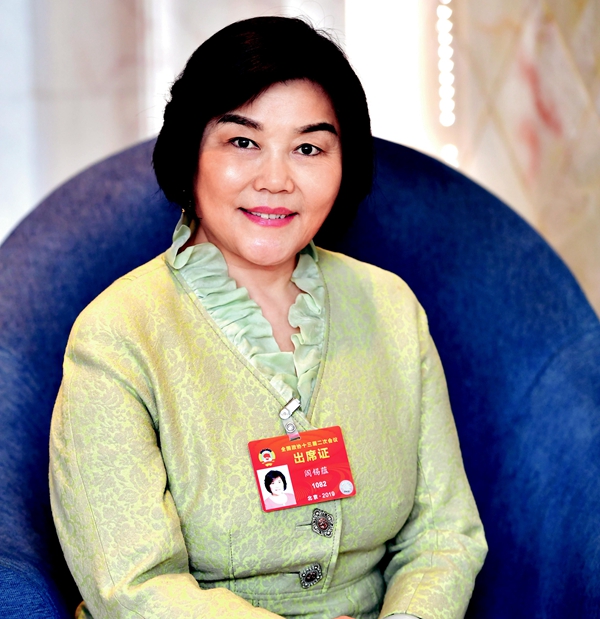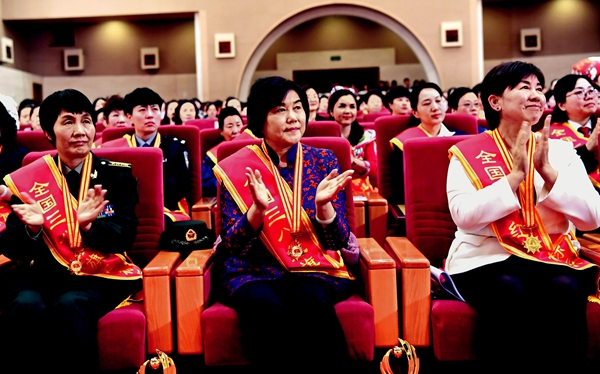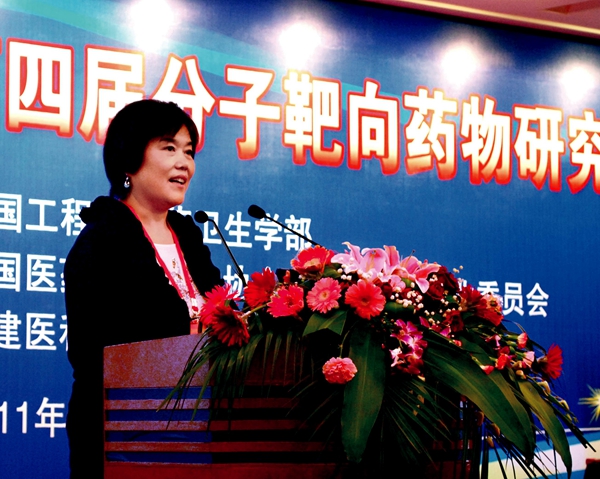Scientist Dedicated to Precise Tumor Research, Treatment
 |
| Yan Xiyun [Women of China/Fan Wenjun] |
Yan Xiyun, a National March 8th Red-banner Pacesetter, an academic with the Chinese Academy of Sciences (CAS) and a researcher with the Institute of Biophysics of CAS, has been dedicated to researching and developing new methods for accurate tumor diagnosis and treatment. She introduced the concept of nanozyme, and she became the first person to use nano-materials as enzyme mimics to create new methods for diagnosing tumors. Her work is well recognized — and well respected — internationally.
New Profession
Yan was admitted to Henan Medical College in 1977. After she graduated from the college, with a bachelor's degree in medicine in 1982, she began working at China-Japan Friendship Hospital, in Beijing. In 1983, she became an intern at the Institute of Biophysics of CAS. At that time, Bei Shizhang (1903-2009), founder of China's biophysics program, was director of the institute.
Yan was not familiar with biophysics theories at first, and she was only responsible for such work as disinfecting and preparing instruments. After a colleague in the laboratory fell ill, Yan was encouraged to perform her colleague's role in an experiment. Yan did a good job. "I found doing scientific research was great fun after I had a first try," Yan said.
As her one-year internship at the institute was about to end, Yan was not sure whether she should stay at the institute, or if she should continue her work at the hospital. "You are young, and you have enough time to obtain professional knowledge. Besides, your academic background of medical science is helpful to your biophysical research," Bei told Yan. He persuaded her to stay at the institute.
Under Bei's guidance, Yan studied biological chemistry at Peking University, and then she studied molecular biology in Japan. In 1994, after she received her Ph.D. in medicine, from Heidelberg University, in Germany, in 1993, Yan joined Memorial Sloan Kettering Cancer Center, in the United States, as a post-doctoral fellow.
In 1997, she returned to China, as she was selected by CAS to join its Hundred Talents Program. The program has helped foster many leading experts and scholars involved in China's academic development since it was launched in 1994.
Yan admires and is grateful to Bei. "Bei was indifferent to fame and wealth. He was modest and gentle, and he had the courage to bring forth new ideas. He cared about us, and he was very responsible for us," Yan said.
 |
| Yan Xiyun (C) [Women of China] |
Enjoying Scientific Research
In 2007, Yan's research group observed that iron oxide nanoparticles possessed peroxidase-like activity. The subsequent documentation was the first report on intrinsic enzyme-like properties of nano-materials. Yan introduced the concept of nanozyme. This finding changed the general idea that nanoparticles were chemically inert, and it opened many new applications for nanoparticles in important fields, including medicine, agriculture, food production, biotechnology and environmental protection.
"Many scientific discoveries were made by accident. That was exactly the charm of scientific research. Researchers should dare to stand up for the truth and be good at imagining and reasoning," Yan said.
Yan became the first person to use nano-materials as enzyme mimics to create new methods for tumor diagnosis, and she was also the first to use nanozyme strips for rapid local detection of infectious diseases, such as Ebola. The research achievements related to the application of nanozymes earned Yan and her team second prize in China's State Natural Science Award in 2012, and the Atlas Award in 2015.
Yan's work on angiogenesis related to inflammation and tumors is internationally recognized. Yan and her team discovered a cell adhesion molecule, CD146, as a novel biomarker for angiogenesis that plays a key role in tumor metastasis. The underlying mechanism of CD146 in angiogenesis has been extensively studied, and the therapeutic antibody targeting CD146 has been developed in preclinical trials to treat tumors.
When asked if conducting scientific research was hard work, Yan answers, "Doing scientific research is a lot of fun." In her eyes, although difficulties are everywhere during experiments, the joy of finally confirming an assumption is beyond the imaginations of those who are not scientific researchers.
Strict, Energetic 'Parent'
Yan is strict when it comes to work. As the Chinese proverb reads, talented students are trained by strict teachers. It is normal for her students to revise their theses a dozen times to meet her requirements. Many of her postgraduate students, as the first authors, have had their theses published in important international journals.
In the eyes of her students, Yan is a beautiful, intelligent woman who knows how to make life interesting. Yan once treated her students to some watermelon after a meeting. She cut the watermelon into the shape of a sailboat. "Innovation is everywhere. If you have the desire to innovate, labor is a pleasure instead of hardship," she told her students.
Yan likes dancing. Each year, during the annual Spring Festival gathering of the Institute of Biophysics of CAS, Yan and her students always perform a group dance, during which they dance to popular music. Yan dances with passion each time. "I never thought scientists should give up good things in life," she said.
She also invites experts in etiquette to give lectures on the skills of matching clothes and the proper way of getting along with people. When her postgraduate students get married, she helps them arrange their weddings, and she gives them gift money (in a red envelop) to express her blessing.
Self-reliant, Confident, Comfortable
Yan was elected President of Asian Biophysics Association (ABA) in 2015. She became the first woman president of ABA. As an outstanding representative of Chinese women scientists, Yan has played a proactive role in international organizations.
She hopes her experience will encourage an increasing number of young women scientists to stick to their dreams. She stresses that women scientists should be "self-reliant, confident and comfortable."
To help enrich the scientific knowledge of the public, Yan has participated in activities to tell the stories behind important scientific discoveries (in plain language), and to encourage teenagers to be passionate about science. She always says science — a very interesting profession filled with curiosity — is about exploring the unknown world.
Yan has a unique view about the work-family relationship. She believes doing housework is a way to relax. Yan says it is a pleasure to conduct scientific research, do housework and pursue beauty. She sets a good example for her students, and her attitude toward life has a great influence on them.
 |
| Yan Xiyun [For Women of China] |
(Women of China)
Please understand that womenofchina.cn,a non-profit, information-communication website, cannot reach every writer before using articles and images. For copyright issues, please contact us by emailing: website@womenofchina.cn. The articles published and opinions expressed on this website represent the opinions of writers and are not necessarily shared by womenofchina.cn.


 京公网安备 11010102004314号
京公网安备 11010102004314号